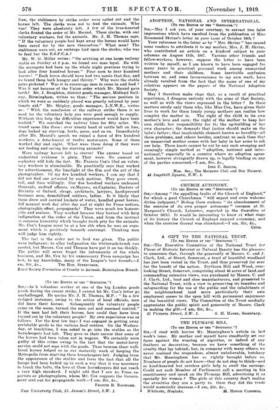[To THE EDITOR OF THE "SPECTATOR.") h volunteer worker at
one of the big London goods yards during the recent strike, I cannot let Mr. Cox's letter go unchallenged. He quotes Mr. J. IL Thomas, M.P.: " In a few isolated instances, owing to the action of local officials, men did leave their horses. Subsequently the voluntary people came on the scene, turned the men out and assumed control." If the men had left their horses, how could they have been turned out by the voluntary people? My own experience was as follows. For the first few days I was engaged in getting away perishable goods to the various food centres. On the Wednesday, at lunchtime, I was asked to go into the stables as the horsekeepers had left. They gave as their excuse that some of the horses had been taken out in wagons. We certainly were guilty of this crime owing to the fact that the motor-lorry service could not cope with the goods. Thus because these wellloved horses helped us in our dastardly work of keeping the Metropolis from-starving these horsekeepers left. Judging from the appearance of the stables and from the fact that all the forage had been locked up in such a way that it was necessary to break the bolts, the love of these horsekeepers did not reach a very high standard. I might add that I saw no Press reporters or photographers, whom Mr. Cox suggests the Government sent out for propaganda work.—I am, Sir, &c., FRANCIS B. RANSFORD.






































 Previous page
Previous page